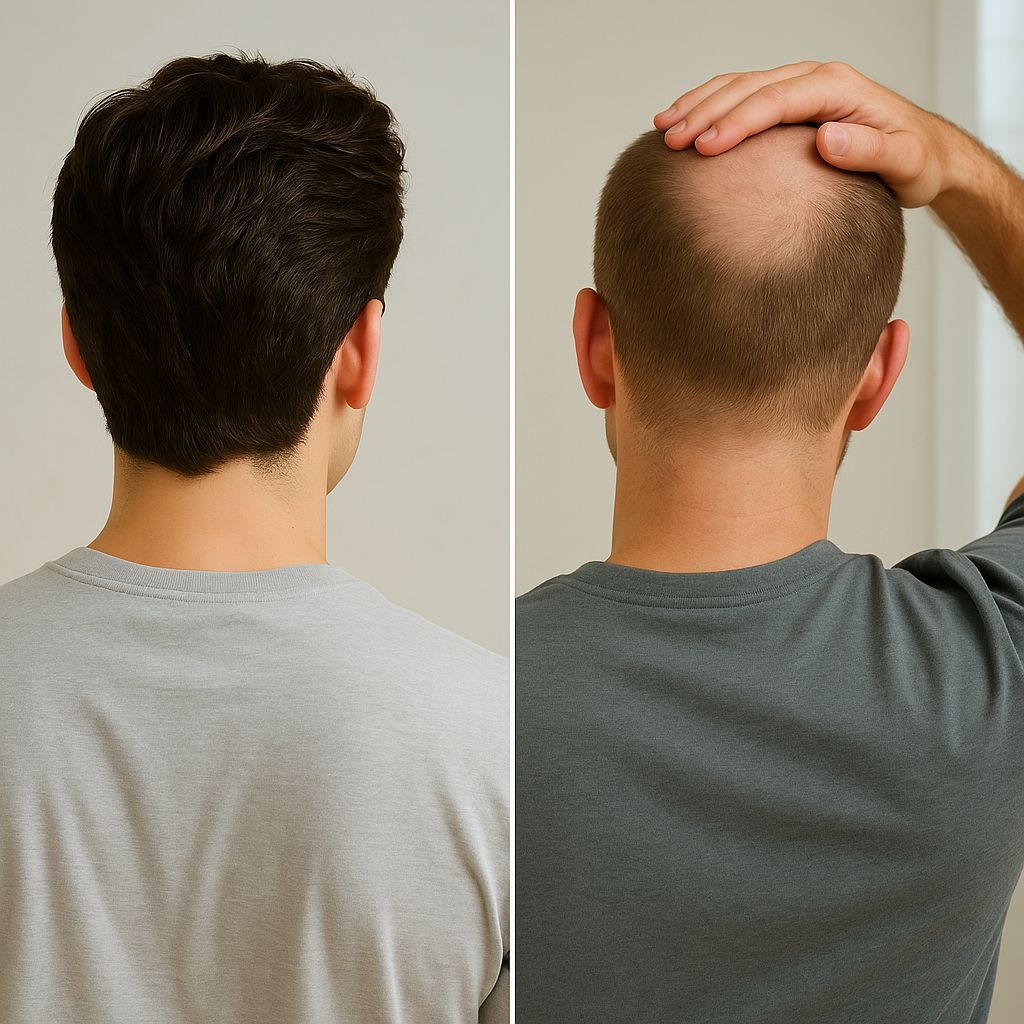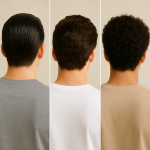Testosterone plays a vital role in various bodily functions, from male reproductive health to muscle development and even hair growth. But does more testosterone always mean more hair? Surprisingly, no. According to Reseachers, the relationship between testosterone and hair is both complex and misunderstood. This article explores the dual nature of testosterone—how it contributes to hair growth and how it also plays a major role in hair loss, especially through its derivative, dihydrotestosterone (DHT).
What Is Testosterone, and What Does It Do?
Let’s start with the basics. The role of testosterone in males includes:
- Developing secondary sexual characteristics (deep voice, facial/body hair)
- Supporting male fertility and sperm production
- Increasing muscle mass and strength, making it central in bodybuilding
- Regulating libido and energy levels
In females, testosterone is also present, although in smaller amounts. It contributes to muscle tone, bone density, and hair growth.
So, whether you’re curious about the role of testosterone in males and females or in the male reproductive system, it’s clear that this hormone is essential.
Testosterone and Hair Growth
Facial and Body Hair Growth
Many people ask, does testosterone help hair growth? The answer is yes—for body and facial hair.
- Testosterone plays a role in facial hair growth by stimulating androgen receptors in the hair follicles of the beard, chest, and limbs.
- Increased testosterone can help hair growth in these regions, especially during puberty and bodybuilding.
So, if you’re wondering is testosterone responsible for hair growth, it absolutely is—but it depends on where.
Scalp Hair Loss: The Androgen Paradox
Here’s where things get tricky. Testosterone itself doesn’t directly cause hair loss—but its more potent form, DHT (dihydrotestosterone), does.
- Androgen hormone and hair loss are tightly linked due to DHT.
- Does androgen cause hair loss? Yes—DHT binds to receptors in scalp follicles, shrinking them over time.
- This condition is known as androgenetic alopecia, the most common type of baldness in both men and women.
Dr. Barbara O’Neill emphasizes that genetic sensitivity to DHT is what triggers hair thinning, not just elevated testosterone levels.
So, if you’re wondering why do androgens cause hair loss, the answer lies in the miniaturization of hair follicles caused by DHT.
Common Questions
Does Testosterone Affect Hair Growth on the Scalp?
Yes, but not positively. While testosterone increases hair growth on the face and body, its conversion to DHT contributes to hair loss on the scalp.
Which Hormones Can Cause Hair Loss?
- DHT (a derivative of testosterone)
- Thyroid hormones (imbalance can lead to shedding)
- Estrogen/Progesterone shifts (e.g., during menopause)
So, hormonal imbalance hair loss treatment must target the underlying endocrine disruption.
Androgenetic Alopecia in Females
While often seen in men, androgenetic alopecia in females is rising. Women with PCOS or hormonal imbalances may experience hair thinning along the crown or part line. Treatment often involves lifestyle changes and natural DHT blockers, as highlighted by Dr. Barbara O’Neill.
Testosterone and Bodybuilding
Benefits of Testosterone for Muscle Growth
When it comes to bodybuilding, testosterone is a key player:
- Increases muscle mass
- Improves recovery time
- Boosts energy and endurance
So, is testosterone good for bodybuilding? Yes, but must be used under medical supervision due to side effects like hair loss, acne, and infertility.
Natural Tips to Balance Hormones and Reduce Hair Loss
- Liver cleansing: A sluggish liver cannot metabolize excess hormones like DHT properly.
- Zinc-rich foods: Help regulate androgen activity.
- Avoid plastics and xenoestrogens: These interfere with hormonal balance.
- Healthy fats (like olive oil, avocado): Support hormone synthesis.
- Castor oil scalp massage: Improves circulation and may block DHT locally.
Conclusion
Understanding the role of testosterone in hair growth and loss helps us appreciate how hormones can either help or hinder our hair health. Testosterone is vital for:
- Facial and body hair development
- Muscle building in bodybuilding
- Maintaining male reproductive health
But its conversion to DHT is what leads to scalp hair loss. Whether you’re researching androgen hormones function, looking into hormonal imbalance hair loss treatment, or trying to balance muscle gain with hair retention, the key lies in understanding your body’s unique hormone response.
By applying natural strategies and staying informed, you can make healthier decisions about your hair and hormone health.




Interesting.
i always admire your appreciation. Thanks